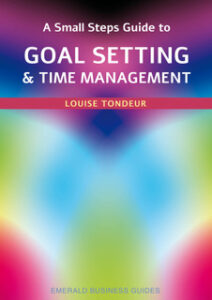
Today’s guest post is excerpted from A Small Steps Guide to Goal Setting & Time Management by writer and creative writing tutor Louise Tondeur.
“God grant us the serenity to accept the things we cannot change, courage to change the things we can, and wisdom to know the difference.”
Reinhold Niebuhr
A goal assumes you want to change something in your life.
And The Alcoholic’s Prayer suggests that there are some things we can change and some things we can’t—some things we can set goals for and some we’re better off forgetting.
We need wisdom to tell the difference, or a blunt and honest look at ourselves.
Many books on goal setting leave out this step, urging readers to do anything in their power to achieve their goals. But there are two important caveats they seem to forget, and they’re important if you’re going to give your goals a reality check:
- Would you really do anything to achieve this goal? Some things may be more important than this goal. It depends what it is. You can be pretty certain that a goal like “stop smoking by the end of the year” has almost no downsides. But would you really risk losing your friends and family or your health in pursuit of a goal?
- In an age that celebrates so-called eternal youth and the power of the individual whilst telling us we can achieve anything we want to, there are actually some things you can’t do.
Different goals for different people
This is the secret behind the Alcoholic’s Prayer: pinpoint what you genuinely need or want to change.
For example, I’m never going to qualify for the Olympics. I’m not doing myself a disservice by admitting it and it doesn’t matter how hard I apply myself or how many times I say positive affirmations.
But it’s not all or nothing: almost everyone will improve their lives by exercising a bit more.
So during lockdown I decided to start doing yoga regularly. Looking at my son, I knew I wanted to be fit and healthy enough both to look after him and to watching him grow up. This is a big deal for me because it requires a change of attitude.
For me, “do yoga regularly” is a better goal than “win a medal at the Olympics” or “run the Chicago marathon.” But if you are a prospective Olympian: good luck!
The wisdom to tell the difference
You’re giving your goals a reality check, but how do you tell the difference between what you can change and what you can’t or what you need to change and what you don’t?
First, get up off the sofa and do something. For example, I started with ten-minute beginner yoga videos on YouTube. An elite athlete might speak to a coach or doctor before undertaking a challenging training program. Make the action something small, but something concrete. Have you:
- Spoken to an expert?
- Been on a short course?
- Spoken to someone who’s already achieved it?
- Done your research? Do you know enough about it to know whether this goal is for you?
- Accepted your limitations?
Low risk? Jump in!
The next stage in giving your goals a reality check is a risk assessment. Firstly, if the risks and the costs are limited, seek out the opportunity to jump in and try something for a short amount of time with low-risk involvement.
For example, if you want to write comedy or screenplays, try one of the Arvon Foundation’s at-home masterclasses. Your risk is limited to the cost of the course, and a couple of hours of your own time. Conversely, don’t commit a large amount of time and money to a project without considering the implications.
Reality check exercise
At this stage of the reality check, ask yourself the following questions and write down the answers in your journal. This is your risk assessment:
- What are the financial implications? What initial steps can I take for free?
- How much will it cost if I continue? Be careful here: buying equipment or paying course fees isn’t the same as achieving your goal.
- What are the risks to the other areas of my life?
- What else is important? What is more important?
- Are there any health implications?
- Have I discussed it with family or friends?
- Can I make the time and space?
- Is this the right thing for me now?
- Can I make the commitment?
- Why do I want to achieve it?
- Does it fit with my values?
You might not need to commit (yet).
My favorite quotation about commitment comes from a book about exploring:
Until one is committed, there is hesitancy, the chance to draw back, always ineffectiveness. Concerning all acts of initiative (and creation), there is one elementary truth the ignorance of which kills countless ideas and splendid plans: that the moment one definitely commits oneself, the providence moves too. A whole stream of events issues from the decision, raising in one’s favour all manner of unforeseen incidents, meetings and material assistance, which no man could have dreamt would have come his way.
W. H. Murray
Once you commit, the magic starts to happen: the kind of magic that’s a result of your determination to succeed. Your brain looks for what you tell it to look for, so if you commit yourself, your brain will look for opportunities to fulfill that commitment. It feels like magic, and in a way it is: everyday magic.
But you don’t have to commit until you’re ready. It’s possible to plan first, to do your research and look at your options before committing, because that kind of preparation frees you up to think about possibilities without the frightening prospect of them becoming reality (yet).
Make sure you watch out for the moment when it is time to commit. Preparation can become procrastination.
Dream the impossible or get more specific?
This is a conundrum. We’re told we need to let ourselves dream, to imagine the impossible, but honestly speaking, is that really an option? Doesn’t that kind of advice lead to disillusionment and cynicism? Conversely, we’re told to “be realistic” and we might have convinced ourselves not to expect too much.
Does it matter when a goal seems impossible, improbable or deluded?
Here’s the problem—and paradoxically those who recommend blue-sky thinking suffer from it, too: impossible dreams are often too broad, too wishy-washy. Telling someone to dream the impossible is too general: how on earth do you implement that kind of advice?
What we need, as a solution to the impossible dream paradox, is a big dose of honesty and a big dose of specificity. Often when stated specifically, a goal is no longer impossible, improbable or deluded—but it would still cost us something to achieve it. Once it’s made specific we can work out that cost.
Who says?
Who told you the dream was impossible? If it was someone very significant—a parent, a teacher, a partner—then it is hard to be objective. How much did they know about it? How has their own life experience limited their outlook?
Again, getting as specific as possible about the steps you would need to take and the time and money you would need to invest will help remove the mysticism around this apparently impossible dream. They might be right. They might not be. If you’re really not sure, test it out by breaking this goal down into its component parts until you get to something you could achieve today—and taking that small step.
What are the consequences?
Stop and do this now. Ask yourself what the consequences of this goal are. If you had achieved this goal what would the rest of your life look like? Work out the consequences. Make sure that you include the emotional consequences too.
In planning to achieve a goal you do take a risk: you risk failure. You risk having to face up to the idea that you tried but it didn’t work. Usually—it depends on the goal—the journey makes that risk worthwhile. I suggest looking this one square in the face before you start, but limit the time you spend doing so.
Get specific to overcome the psychological barriers
The latest life improvement guru might tell us that we’re thinking too small or that we should think big, but isn’t that also too general to be useful?
Well, yes, but sometimes lack of confidence does make us put psychological barriers up. What’s the solution?
Get specific again and turn a specific doubt into an achievable goal. It’s possible to learn to do all of the following things and/or to get expert help. What each one needs is an investment of time:
- “I could never start a cake-making business, I don’t know anything about marketing.”
- “I could never teach in Germany, I’m terrible with languages.”
- “I’ll never have a baby because the doctor says I have to lose weight first.”
Here’s how to talk yourself out of barriers such as these.
1. Try inventing the BIGGEST outcome you can, using and reversing the doubts you have about it. Write it down. Have fun with it. We’ve dealt with the serious side, now you can play:
- “My cake-making business dominates the market in cupcakes.”
- “I learn five languages and travel around the world giving master classes in my subject.”
- “I joined a weight-loss program and have started a family. Now I give advice on weight loss, fertility and family planning.”
2. Can you get even bigger? (Notice that these get more specific as they get bigger, and not less specific.)
- “I write a series of books on cake making and become a celebrity baker, making regular appearances on television. I become known internationally as an expert in both home start-up businesses and cake decoration. I take on trainees each year who are specially chosen from the long-term unemployed.”
- “I am a multilingual expert in my subject, training thousands of other people to teach it. I set up academies the world over using my specially developed learning and teaching style. Many of my teachers go into schools up and down the country to start language clubs for young people.”
- “I have adopted four children and had two myself. I run a business helping women to get fit for pregnancy. I have marketed the franchise internationally and so far I have helped thousands of women to have a baby or to live a fulfilling life without children. I donate a portion of my profits to women running start-up ventures in the developing world.”
What you’ll notice when you make your dreams bigger like this is that when you get specific they no longer feel vague and unformed. You might not want to achieve the biggest version of your dream but you should now know how to work out the small steps you’d need to follow in order to get there. You might realize that this goal isn’t what you want after all, or something you’re able to achieve right now. That’s okay too.
3. What’s the first small step required to realize your so-called impossible dream? Keep getting smaller until you find something you could do today.
- “My first small step was enrolling in a free course for new businesswomen run by the local council. Actually, it all started when I picked up a leaflet in the library.”
- “My first small step? I have a good friend who speaks German, who went back to college. We worked out a skills exchange. He needed help with his essays and in return he helped me to learn his mother tongue. It all started when I invited myself to dinner and his very large family were chatting away in German.”
- “I’d say my first small step was making that first phone call to a weight loss counselor. It all started when I got brave enough to pick up the phone.”
Test your goals: your reality check
Go through your list of goals. Now that you’ve thought about reality checking, do you need to make changes? Are any irrelevant? Unachievable? Some (seemingly) impossible goals are okay—but make them as specific as you can. Have some concrete smaller goals too. If you have few big dreams, introduce some, or make one or two of your goals bigger. If you have few concrete smaller goals, set some now or make some smaller. Come back to this reality check as regularly as you need to, or whenever your goals get too general and vague.
Note from Jane: If you enjoyed this post, be sure to read A Small Steps Guide to Goal Setting & Time Management by Louise Tondeur.

Louise Tondeur is a writer and creative writing tutor. Her latest book is a short story collection, Unusual Places. She also publishes writing guides including How to Write a Novel and Get It Published. You can find out more at The Small Steps Guides or at her author website.


I just had this very conversation with a group of readers. It’s as if the Universe heard us. Ha! I’m so glad you said that not every big dream can be obtained and that’s okay. But taking steps to determine if your dream in one form or another is the way to go. Great article.
Yesterday in a writing conference session we were challenged to commit our writing goals to paper for 7 minutes. I couldn’t resist writing my big dream goal, definitely feeling inspired as I nailed down the details. But I once had someone point out to me the difference between “possible” and “probable,” and I’m pondering which my goals are (although we can never really know). I’m wondering how you feel putting a deadline for the achievement impacts this process. Once we have the goal, are we okay with it taking two years of serious effort, five years or ten years?
Speaking for myself, I don’t put a deadline on outcomes I can’t control. E.g., “I will have an agent in 2 years” or “I will secure a six-figure advance within 5 years” – you can’t control these things.
However, you might consider, “I’m willing to sacrifice/compromise/devote myself to X effort for Y years, and if I don’t achieve what I’m looking for, I will do Z.”
The problem with applying deadlines to creative careers is that they don’t move predictably or in linear fashion.
Excellent advice.
It’s simple: a goal is something that is up to you, and you alone. The rest are wishes, dreams, aspirations and things to strive for. I never set a goal that depends on others because others have their own agendas.